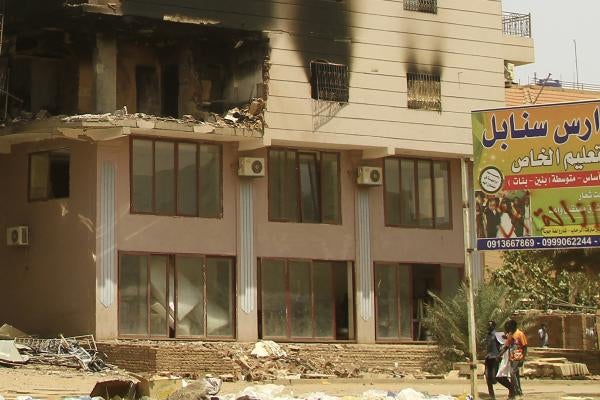Two weeks into the brutal conflict between rival military forces, the situation in Sudan is deteriorating at an alarming rate.
Since fighting broke out on April 15 between the Sudan Armed Forces (SAF) and the Rapid Support Forces (RSF), there have been unprecedented battles in the capital Khartoum, as well as heavy fighting in towns in the Darfur region, notably Nyala, Al Fashir, and El Geneina.
Hundreds have been reported killed and thousands injured.
The actual casualty numbers are likely to be much higher, as many people cannot reach hospitals because of insecurity. A number of hospitals have been hit in the conflict, and many others have had to shut down because of lack of supplies, electricity, or water.
Millions of people also have no power and no water due to military strikes on key infrastructure. UN relief chief Martin Griffiths says the humanitarian situation is now at “breaking point.”
This escalating humanitarian crisis is deeply rooted in a long-term human rights catastrophe, for which the outside world shares considerable blame.
Sudan’s military forces have a long history of serious violations of international humanitarian law and human rights law. We’ve seen it in the context of counterinsurgency operations in Darfur, indiscriminate aerial bombings in Southern Kordofan and Blue Nile, and crackdowns against protesters in Khartoum and elsewhere.
For decades, governments and global institutions have failed to address security force abuses in Sudan despite countless calls for justice by Sudanese protesters and activists.
The result is, no one in power ever paid any serious price for serious crimes, and so military forces feel free to keep committing them.
There are now efforts by the African Union, the regional Intergovernmental Authority on Development, and the UN Security Council to end the current fighting. That’s good, of course.
But the world must also get to the root of the problem and start insisting on accountability for abuses.
One critical step would be for the UN Human Rights Council – the UN’s top rights body – to end its inaction and take measures to hold to account those responsible for serious crimes in Sudan.
It’s hard to see how Sudan’s cycles of violence will ever end without such a reckoning with justice.





